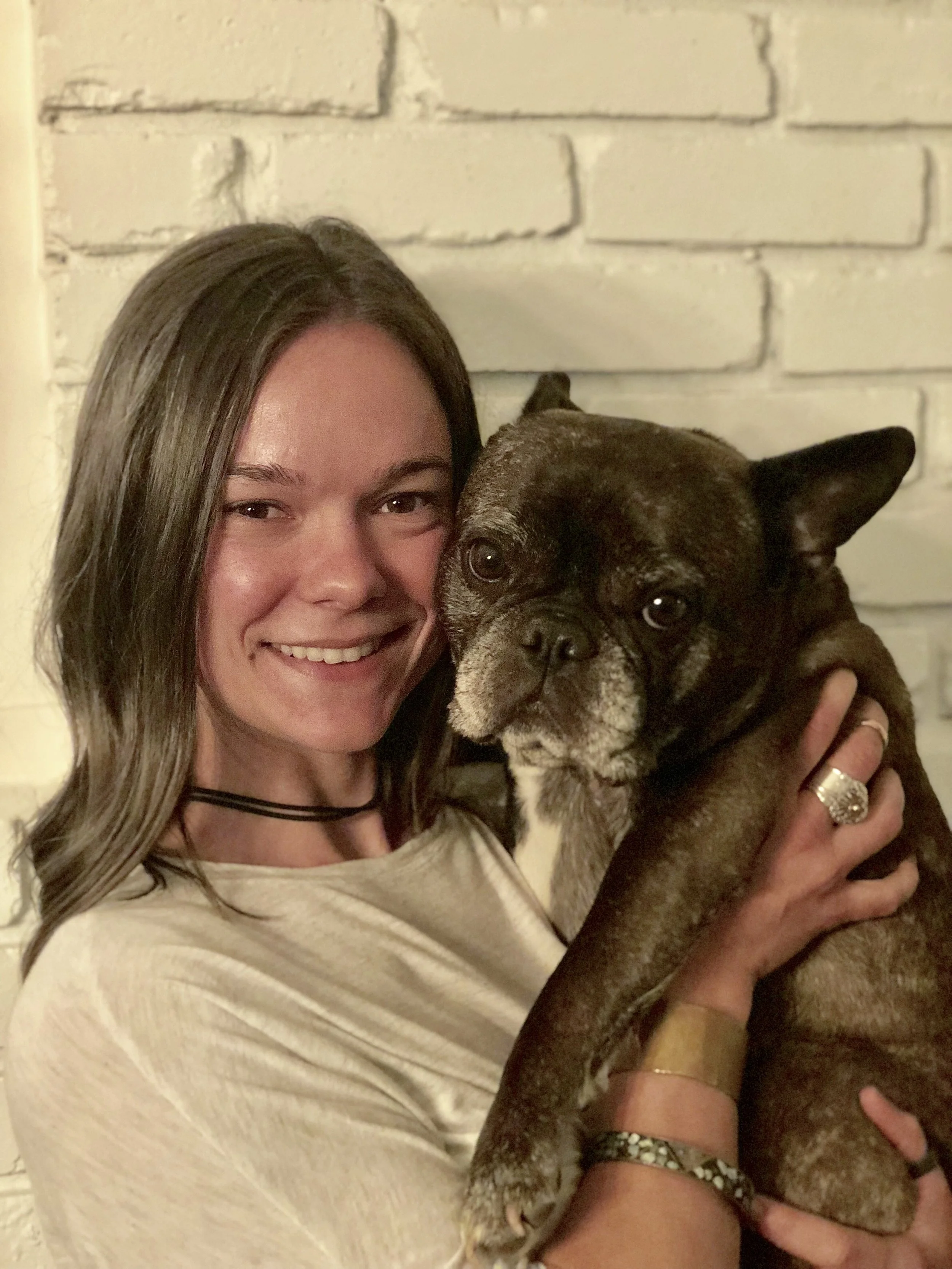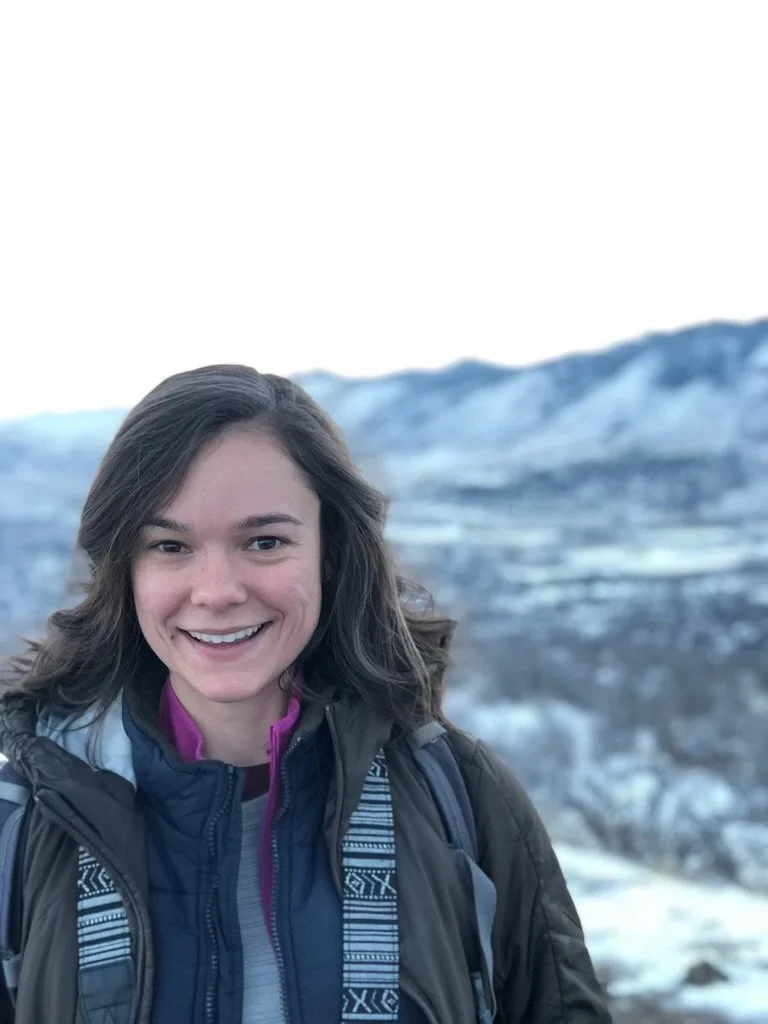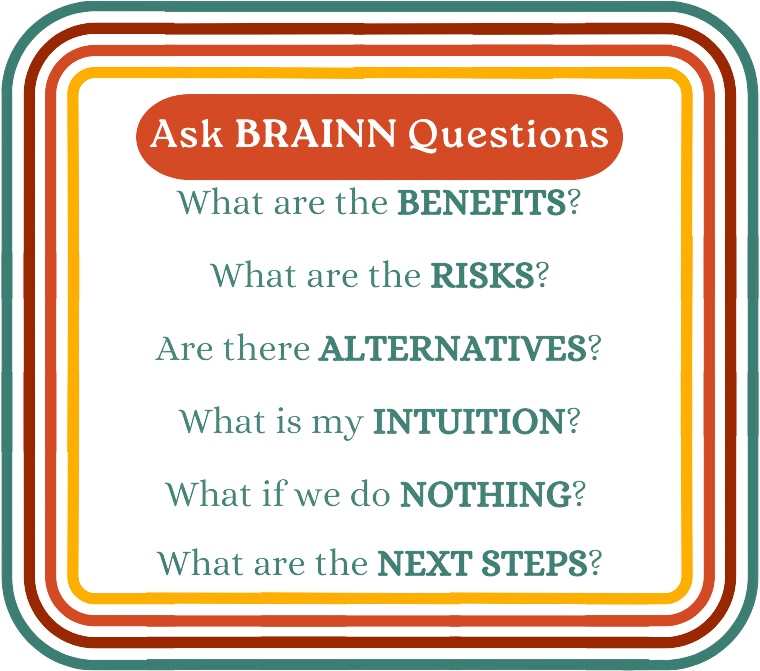Hi, I’m Hannah
My husband Brennan and I married in 2006. We fell in love when we were 15 years old. We live in the heart of Atlanta, GA with our two French bulldogs, Millie and Maggie. Brennan and I have chosen not to have children. But I am inspired to step up and help other women bring life into this world.
Women have been supporting other women in the birthing process since the beginning of humanity … it’s an honor to use my skills to carry on this tradition as a doula. Working in the field of women's health before becoming a doula opened my eyes further to the magical strength that women possess.
I have been an avid rock climber for 9 years—a mix of creative problem-solving, emotion management, and physical exertion—it’s addicting. I’m also a beekeeper. Working amid thousands of stinging bees requires a certain level of calm and control. Plus, most of the bees in the hive that do the majority of the work are females … true girl power!
A love of people, a love of the gift of life, and a love of helping others have brought me here to be your birth doula.
Interview with Hannah (a.k.a. “the doula gal”)
Q: What training and certifications do you have?
The International Doula Institute provided a one year training and certification program. I used their reputable program to become a certified birth doula, postpartum doula, lactation consultant, and childbirth educator. Their programs fully equipped me to support expecting families.
Q: How do you typically support women and their partners during labor and childbirth?
As a birth doula, my goal is to educate, empower, and support. That starts with a private childbirth education course, where I teach families about the birth process and how the human body so beautifully labors.
Learning how to navigate the birth process through coping techniques and labor positions empowers the birthing person and their partner to take charge of their labor while surrendering to it. Teaching partners how to support, protect, and encourage the birthing individual helps them become proactive participants.
After the education class, I assist the family with creating a “birth plan."
My role during the labor is to provide physical, emotional, and informational support for the duration of the labor until the birth and to create an environment of comfort, confidence, and control for the birthing individual and partner. Once the baby is born, I stay for 2 hours to support the oh-so-precious golden hour where resting, bonding, and, breastfeeding initiation are the top priorities. Pictures are essential to capture these treasured moments.
I schedule a postpartum visit 4-6 weeks after the birth to check in on the family. Often times, it is helpful to talk through the birth story and relive those moments with the doula.
Q: Why is it important to take a childbirth education course?
Labor and birth for a first-time parent can feel overwhelming, a fear of the unknown. A private childbirth class allows you to peek behind the curtain, and learn how labor works and what is actually happening in your body during labor. Learn the power of your own mind. Learn how your hormones delicately navigate you through the labor and delivery journey. Learn tools to successfully cope with birth waves. Educate yourself on the menu of options and interventions the hospital system or your midwife offers during the labor process. Learn how to make informed decisions in the moment. All of this knowledge will give you a solid foundation to choose how you want to look at labor. Knowledge is power. And fear of the unknown turns into excitement for what is to come.
Q: At what point should I contact a doula during pregnancy? Is it ever too late or too early?
Easy answer! Anytime before labor begins.
Q: Can you walk me through what a typical prenatal visit with you looks like?
A prenatal visit is a 2 hour education and planning meeting. I learn about the family's preferences and concerns. The birthing family learns how to create a “birth plan" and I give them resources to educate themselves on their options for the “birth plan.” I initiate a practice session of breathing techniques, labor positions, and comfort measures to teach the couple how to physically navigate labor. I also teach mental exercises and techniques to help the birthing person cope during labor.
Q: How do you support women who desire natural childbirth versus those who may want medical interventions?
My support is the same. No matter how women choose to labor, they receive emotional, physical, and informational support from me. I am there to support whatever choice they make. Whererver you choose to birth, I’ll be there.
Q: How do you support clients if their birth plans need to change unexpectedly?
Labor can throw a curve ball and plans can change. This is where informational support is key. By helping clients ask their provider appropriate questions, I help facilitate the ability to make an informed decision.
In an emergency situation, the medical staff takes the lead in handing the emergency. I am there to help the birthing individual stay calm and make informed decisions, while supporting their partners as well.
Q: Can you describe a particularly challenging birth experience you've assisted with and how you handled it?
During one birth, the mother’s epidural did not got to plan, causing unexpected physical and emotional hurdles. Thankfully, we had prepared techniques for a scenario like this, and I was able to coach her and her husband through the uncomfortable situation. Even though it was emotionally and physically exhausting, she felt empowered by her ability to navigate the birth waves even when things didn’t go entirely to the birth plan.
Q: How do you communicate and collaborate with medical professionals such as doctors and midwives during labor?
Creating a comfortable space for the mother is a doulas goal. This involves being her advocate and helping her make informed decisions during labor. I never speak for the parents to medical professionals. I am the parents support and sounding board. My goal is to create a positive rapport with the medical staff so we can work as a unified team to support the labor.
Q: Can you discuss your stance on advocacy during childbirth? How do you ensure my preferences are respected?
Advocacy has many facets. My goal is to fill a birthing individual with confidence in their ability to make informed, thoughtful choices during their labor. This starts with childbirth education during pregnancy, creating a foundation of knowledge. When situations arise during labor and "solutions" are offered, I work to ensure the birthing individual and partner have time to discuss their choices. During that time, I work as a sounding board for them, reminding them of their preferences and pointing out questions they can ask to inform their decision. It is not the place of a doula to speak for a birthing individual or partner, but I empower them and give them the confidence to speak up for themselves.
Q: How do you support clients emotionally and mentally during pregnancy, labor, and postpartum?
During pregnancy, support comes in words of encouragement and education and reminding clients that they are enough and equal to the upcoming labor and delivery. Also, empowering clients to stick to their birth wishes when third trimester interventions are offered.
While the mother is in labor, encouragement is key. During moments of tiredness, I remind them of their innate ability and strength. Helping them stay in a confident headspace is so important, since the body is capable of more than the mind can fathom.
After the baby is born, I conduct a postpartum meeting to help the birthing individual and partner process the birth, since it is often a blur of hightened emotions. This helps them piece together the events and understand the complete story.
Q: Can you accommodate specific cultural or religious preferences during childbirth?
A doulas job is to support the wishes of the birthing individual. Those cultural and religious wishes are part of their precious birthing experience.
Q: Lastly, what makes you stand out as a doula compared to others?
Meeting your baby is a life changing moment filled with love and excitement and connection. Embracing joy during the journey of pregnancy and labor softens the entire experience, not just after the baby is born. My goal is to empower a mother to let go of fear and embrace her power to find joy during this pivotal event in her life. My empathy and deep respect for the power of other women pushes me to help women find that joy.
Q: Can you tell me about your experience as a doula? How long have you been practicing?
I started working with expecting families at the end of 2022. Since then, I have supported births of all types—natural births, c-sections, and planned inductions. My private childbirth education courses give me an opportunity to work with each family ahead of time to educate and prepare them for the journey ahead.
Q: What inspired you to become a doula?
I was completely engrossed in my friend Laura's birth story. During which, she mentioned that I would be a great doula. At first, I had no idea what she was talking about. After learning what a doula is, my first reaction was to laugh. I don't have any kids. I'm the youngest of my family. What do I know about childbirth? But she planted a seed in my mind. After learning more on my own, I realized that being a doula is about standing with and supporting another human going through a life changing moment. Supporting a family bringing new life into the world is true privilege. That idea struck a chord in me. I wanted to stand with and support families bringing life into this world.





